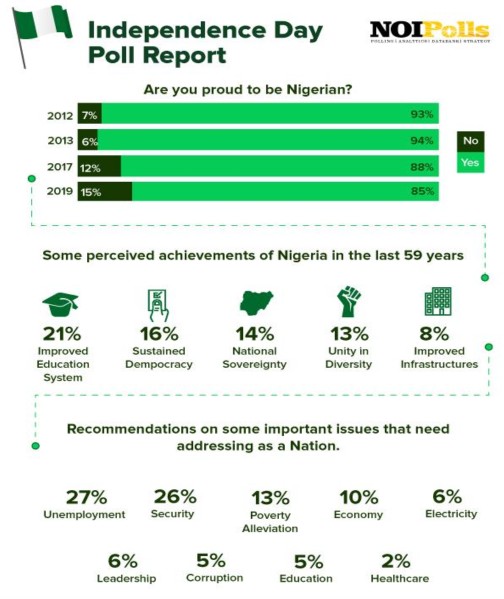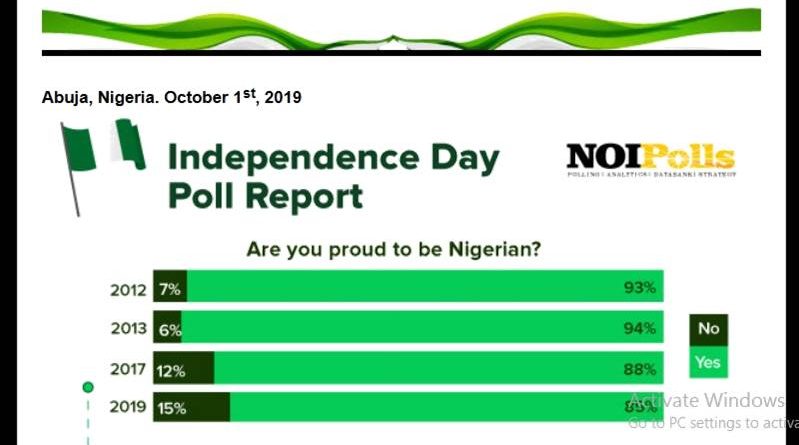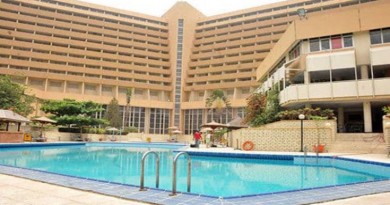Nigeria’s Independence Day Poll Report – NOIPolls
The annual Independence Day Special Edition Poll results released by NOIPolls Limited have revealed that an overwhelming majority of Nigerians (85 percent) say they are proud to be Nigerians. This is heart-warming and gratifying considering the various economic, security and infrastructural challenges Nigerians face on a daily basis and also vis-à-vis the negative reports about our teeming populace attesting to the fact that they are not proud to be Nigerians. Only 15 percent say they are not proud to be Nigerians. However, it should be noted that there is a 3 percent decrease from the 2017 figure in terms of the proportion of Nigerians being proud to be Nigerians.
5 in 10 Nigerians (51 Percent) said they are proud to be Nigerians because ‘it is their Mother’s land’, which depicts the level of patriotism Nigerians have; even in the face of prevalent challenges. Conversely, Nigerians were asked about their reasons for not being proud to be Nigerians and 30 percent of Nigerians stated that ‘nothing is working in the country’. Further findings reveal that in 59 years since independence, some Nigerians (21 Percent) adduced that ‘improvement in the educational system’ is the greatest achievement the country has recorded. Other achievements mentioned by Nigerians include ‘sustainability of democracy’ (16 percent) and ‘sovereignty as a nation’ (14 percent). Additionally, the survey results reveal that ‘unemployment’ (27 percent) is the main issue Nigerians want the government to address with ‘security’ a close second at 26 percent. At the zonal level, unemployment was cited most in the South East (38 percent) and South South (35 percent) while security was cited most in the North East (39 percent) and North West (38 percent). It is very important for the government to expedite action in this direction considering the danger it portends for the country. These are key findings from the Independence Day Poll conducted by NOIPolls in the week of September 23rd, 2019.
Background
Nigeria got her independence precisely on 1st October 1960 from the British colonial masters. From then till now, it has been a long, arduous and eventful journey full of ups and downs, highs and lows, successes and failures. It has been a journey characterized by coup plots and counter coups, civil war, return to democracy and everything in between. Within the last 59 years of our independence as a country, Nigeria has experienced many years of military rule starting from the coup that took place in 1966 to when the military handed over power to civilians on May 29, 1999. Since 1999, Nigeria has experienced 20-years of uninterrupted democracy. This singular feat is regarded in many quarters as one of the most significant achievement Nigeria has experienced since independence.
It is imperative to mention that after 59 years of independence, Nigeria still battles with the hydra-headed monster – corruption in many spheres of life, and we continue to suffer the burden of several poor and dilapidating infrastructures, inadequate power supply and poor road networks amongst many other challenges. These afore-mentioned challenges have disrupted and stunted our steady and eventual growth as a nation. It goes without saying that the country has largely under-developed since its independence to date in provision of basic amenities to its citizens which is paramount and a panacea for effective growth and development. However, the Independence Day celebration in Nigeria is usually characterized by pomp and pageantry, march past parade by the men of the armed forces and cultural dances amongst other activities to mark the day. A public holiday is usually declared where people take time to re-unite with their families and friends to celebrate the day. It is also a day of stock-taking and retrospective analysis of our achievements as a country. Against this backdrop of the occasion of independence, NOIPolls conducted a survey to feel the pulse of Nigerians regarding our progress since independence and whether or not they are proud to be Nigerians amongst other questions asked.
Survey Findings
The survey sought to know how proud Nigerians are and so the question was asked, are you proud to be a Nigerian? The survey results reveal that an overwhelming majority of Nigerians (85 percent) say they are proud to be Nigerians, and the North-West accounted for the highest proportion (93 percent) who say they are proud to be Nigerians. It is especially heart-warming to know that such a large proportion of Nigerians are proud to be citizens despite the glaring and apparent challenges Nigerians are facing which include security, harsh economic realities, deficit in housing, electricity dilapidation, joblessness, etc. It is hoped that government will channel its energy in the right direction in ameliorating these seeming challenges.

Trend analysis across the years show that there has been a steady decline in the proportion of Nigerians who say they are proud to be Nigerians. For instance, results in 2012 show it was 93 percent, and then it increased to 94 percent in 2013, then 88 percent in 2017, and 85 percent in 2019. This decline in proportion should not be taken lightly as it shows that citizens are gradually losing their sense of pride as citizens and this may not be unconnected with the various challenges we face as citizens in our day to day activities.

Additionally, Nigerians were asked of the reason they are proud to be Nigerians and the results reveal that 51 percent say they are proud to be Nigerian because ‘it is their motherland’. Other reasons include ‘it’s a peaceful nation’ (13 percent), ‘We are blessed with natural resources’ (9 percent), ‘we are resilient people’ (5 percent), ‘giant of Africa’, ‘Basic human right I enjoy’, ‘cultural heritage’, ‘I’m being patriotic’ all tied at 4 percent each. ‘Favourable climatic condition’ and ‘sovereignty as a nation’ (2 percent) each amongst other reasons that has been cited by Nigerians.

Conversely, the survey sought to know why respondents say they are not proud to be Nigerians and the results reveal that 30 percent say that ‘Nothing is working in the country’. Other reasons include ‘bad governance’ (28 percent), ‘economic hardship’ (26 percent), ‘insecurity’ (6 percent), ‘high unemployment’ (4 percent), ‘marginalisation’ and ‘high rate of corruption’ both (3 percent) a piece. Government needs to work hard to win over this proportion of Nigerians by providing basic amenities in the country.

In order to ascertain the level of achievement of Nigeria in the last 59 years of our nationhood, the survey results revealed that 21 percent of Nigerians say that ‘improvement in education’ is the most important achievement. This is then followed by ‘sustainability of democracy’ (16 percent). Also, ‘Sovereignty as a nation’ is next (14 percent), ‘Unity in diversity’ (13 percent), ‘improved infrastructure’ and ‘Improved telecommunications’ (8 percent) a piece, ‘Improved agriculture’ (6 percent) amongst other achievement.

Nigerians were asked in the course of the survey, the most important issues they would want the government to address head on and varied responses were received which include ‘unemployment’ (27 percent) with the South East region accounting for the largest response in that regard (38 percent). Unemployment is indeed a pressing problem and there is the utmost need to address it as it portends a lot of danger to the nation if not addressed. Other issues Nigerians earnestly want the government to address include ‘Security’ (26 percent), ‘Poverty’ (13 percent), ‘Economy’ (10 percent), and ‘Electricity’ (6 percent), ‘Education’ (5 percent) amongst other issues.

Trend analysis over the years show that the proportion of Nigerians that state job creation as the problem government need to address increased from 13 percent in 2016 to 27 percent in 2019 and also security increased from 6 percent in 2016 to 26 percent in 2019. This drastic increase in proportion underscore the importance of addressing this twin issue of security and job creation immediately.

In conclusion, the poll has shown that despite the many myriad of challenges Nigerians are facing, a majority (85 percent) identify with being proud to be called Nigerians. It is indeed heart-warming because of the challenges of security, economy, dilapidated infrastructure, etc. amongst other challenges Nigerians are facing. Nigerians gave reasons for being proud to be Nigerians which include ‘it is my motherland’ (51 percent) which depicts a sense of pride and patriotism amongst the citizens. More so, the proportion of Nigerians who stated that they are not proud to be Nigerians expressed that ‘Nothing is working’ (30 percent) as their reason for not being proud to be Nigerians. There is the need to address some of challenges we are facing in different sectors of the country to restore eroded confidence in the citizenry. Also, a large proportion of Nigerians (21 percent) attested to the fact that education is the most important achievement Nigeria has experienced in the last 59 years. Indeed, the educational sector has grown overtime since independence accounting for many schools at all levels spread across the country. However, there are challenges that need to be addressed in the sector. Lastly, for the country to restore confidence and achieve the dreams of the founding fathers of this country, there is need for the government to address the various myriads of challenges we are facing in the country. It is hoped that in the nearest future, Nigerians will experience great development in their overall wellbeing, and only then will all Nigerians truly be proud to be Nigerians.

Survey Methods
The opinion poll was conducted in the week of September 23rd, 2019. It involved telephone interviews of a proportionate nationwide sample of 1,000 randomly selected phone-owning female Nigerians aged 18 years and above, representing the six geo-political regions and 36 states and the FCT of the country. Interviews were conducted in 5 languages – Igbo, Hausa, Yoruba, Pidgin English and English. Although we can say with 95% confidence that the results obtained were statistically precise – within a margin of error of plus or minus 4.65%; we recognize that the exclusive use of telephone polling has its limitation of excluding non-phone-owning Nigerians. Nonetheless, with the country’s tele density put over 100 percent by the Nigerian Communications Commission (NCC), we consider our telephone polling approach appropriate. Also, given the rigorous scientific process of randomization and stratification applied, we can confidently stand by the validity of our methodology and approach. NOIPolls Limited, No1 for country specific polling services in West Africa. We conduct periodic opinion polls and studies on various socio-economic and political issues in Nigeria. More information is available at www.noi-polls.com.
Disclaimer
This press release has been produced by NOIPolls Limited to provide information on all issues which form the subject matter of the document. Kindly note that while we are willing to share results from our polls with the general public, we only request that NOIPolls be acknowledged as author whenever and wherever our poll results are used, cited or published. NOIPolls hereby certifies that all the views expressed in this document accurately reflect its views of respondents surveyed for the poll, and background information is based on information from various sources that it believes are reliable; however, no representation is made that it is accurate or complete. Whilst reasonable care has been taken in preparing this document, no responsibility or liability is accepted for errors or fact or for any views expressed herein by NOIPolls for actions taken as a result of information provided in this report. Any ratings, forecasts, estimates, opinions or views herein constitute a judgment as at the date of this document. If the date of this document is not current, the views and content may not reflect NOIPolls’ current findings and/or thinking. Press Contact the Editor Email: [email protected]
– NOIPolls




